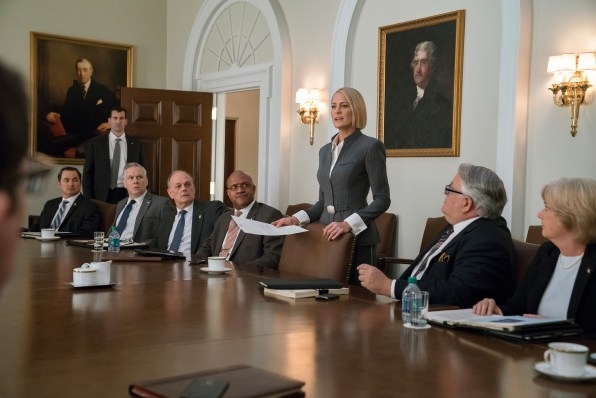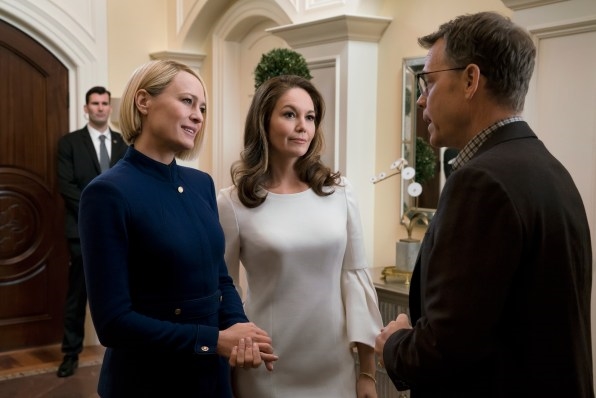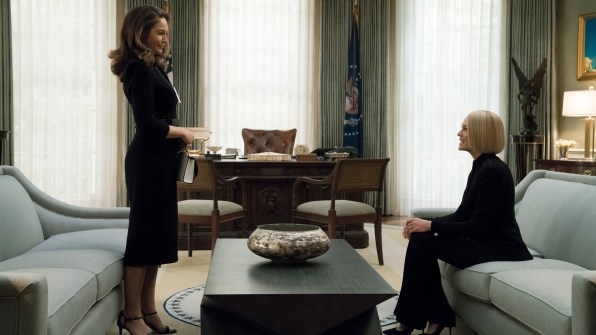House of Cards began its first term just after Obama was re-elected for his second. Now, it’s going out in the middle of Trump’s almost cartoonishly catastrophic run as president. Perhaps the increased eventfulness of real life these days is why the show draws from it more than ever.
I personally stopped watching House of Cards after its fourth season in 2016. There was no major decision to wash my hands of it. The show had qualitative peaks and valleys, like most shows, but ended its fourth season on a promising note. (Kevin Spacey’s malevolent president, Frank Underwood, wanted to start a war, and his co-conspirator wife, Claire, played by Robin Wright, was now breaking the fourth wall to address the audience directly alongside him.) By the time the fifth season rolled around, though, things had changed. The world had changed.
Keeping up with all the grisly details of the nascent Trump administration provided more spine-tingling twists and turns than any fictional political thriller ever could. There was a sprawling cast of characters catering to the sordid whims of a veteran TV personality, when they weren’t backstabbing each other. It wasn’t exhilarating. It was exhausting. The last thing I personally wanted to come home to at night was more political intrigue from a duplicitous president.
A few months after that fifth season premiered in the summer of 2017 came further disincentive for watching House of Cards. The show’s producer and star, Kevin Spacey, was outed as an alleged sexual predator, who reportedly made the work environment around the Netflix series toxic. He was summarily dismissed from the show, an early scalp for the #MeToo movement, and the future of House of Cards looked altogether uncertain. Months later, Netflix announced it would go on with a final, Spacey-free season.
With the midterm election just four days away, today Netflix delivers us eight episodes centered around President Claire Underwood’s administration. (If you want to find out more about her unusual character arc from First Lady to President, there are many comprehensive recaps available online.) Kevin Spacey’s Frank Underwood is now dead, and the circumstances around his death comprise an unfolding mystery. On paper, it may read like fan service for the Still With Her set to have a First Lady finally succeed her husband into office, but the comparison is not flattering. Robin Wright steely-gazes the hell out of her part, but the character of Claire Underwood is a morally vacuous manipulator, just like her husband, with bodies under her Ferragamo belt.
House of Cards’ swan song sort of toggles between what it might’ve been like had Hillary Clinton become president and what many people in the country wish it were like for Donald Trump right now. In order to create this political bouillabaisse, the chefs stir in a lot of ingredients from real life. Below is a spoiler-lite rundown of them.

[Photo: courtesy of David Giesbrecht/Netflix]
The #MeToo Movement
We’ve learned enough about the shape of Claire Underwood over the past five years that finding out more about what molded her feels beside the point. All the same, the show flashes back to a group of taunting boys cutting the dress from her body as a young girl. Claire refuses to be a victim and fights back in the only way she can. Her mother later notes, “Pretty girls have a responsibility to their beauty,” and suggests that her daughter provoked those boys somehow. The mother character clearly represents women indoctrinated by the patriarchy and is surely meant as a contrast to the current public sentiment. However, when the show’s writers conceived of this formative moment for Claire, they probably didn’t predict that we would see it a month after Kavanaugh got confirmed.

[Photo: courtesy of David Giesbrecht/Netflix]
SCOTUS Appointment Subplot
Speaking of Kavanaugh, this season has a SCOTUS appointment subplot. But let’s not speak further of Kavanaugh.
Closely Examining Presidential Gestures
“Are we really going to waste time dissecting a gesture between two women?” a CNN anchor asks in the world of the show. Yes, they are, and yes, it’s perfectly true to life. At one point, Claire Underwood subtly physically rebuffs another character on live TV, and becomes the subject of rampant public speculation. This kind of sleuthing has become particularly popular during the Trump era, with Twitter often reading much into First Lady Melania’s intentions.
Political Figures Denying Contact with “the Russians”
The circumstances under which this happens in the show are wildly different from real life, but it happens just the same.
Hypocritical Calls for Political Civility
“The level of discourse in this city,” bemoans Koch brother surrogate Bill Shepherd (Greg Kinnear), despite what he has personally done to contribute to that discourse. (Diane Lane plays Bill’s sibling Annette Shepherd–a Koch “sister,” if you will—who was Claire’s best friend in college and comes back into her life to squeeze out favors.) This should ring a familiar bell for everyone who has endured media and political figures lamenting the tone of Michelle Wolf’s Sarah Huckabee Sanders roast or been asked to empathize with Alan Dershowitz having no friends in Martha’s Vineyard.

[Photo: courtesy of David Giesbrecht/Netflix]
The Rise of the Tomi Lahren Brigade
In addition to representations of traditional media and the blogosphere, the series now features a non-blonde Tomi Lahren (played by Athena Karkanis) who does color commentary in front of an American flag. Her signature sign-off–“I’m Melody Cruz and that’s what I got”–feels particularly realistic.
A Shady Analytics Firm
On the show, Gardner Analytics is buying up newsrooms and also owns a Sinclair-like TV arm. It’s a stand-in for a lot of politically aligned corporate evils within the private sector, but the fact that Gardner has an app that steals your data is a nod to Cambridge Analytica.
(26)